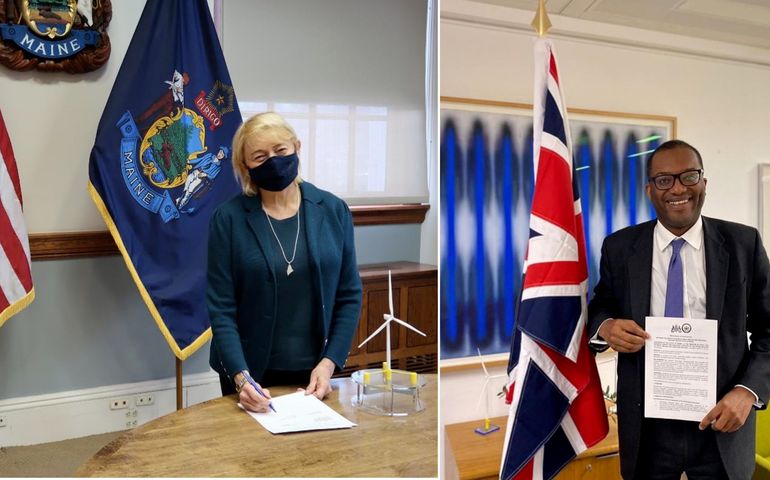Shared offshore wind focus prompts Maine, UK clean energy collaboration
 Photos / Office of the Governor
Gov. Janet Mills and Kwasi Kwarteng, the United Kingdom’s Minister of State at the Department of Business, Energy and Industrial Strategy, signed agreements this week on a climate change mutual effort between Maine and the UK.
Photos / Office of the Governor
Gov. Janet Mills and Kwasi Kwarteng, the United Kingdom’s Minister of State at the Department of Business, Energy and Industrial Strategy, signed agreements this week on a climate change mutual effort between Maine and the UK.
A mutual focus on offshore wind energy has prompted an agreement between Maine and the United Kingdom to collaborate on research and development of clean energy technologies aimed at supporting carbon-neutrality efforts.
Gov. Janet Mills and Kwasi Kwarteng, a member of Parliament and the U.K.'s minister of state at the Department of Business, Energy and Industrial Strategy, have signed a five-year memorandum of understanding to enhance cooperation between Maine and the U.K. It took effect Wednesday.
Both the U.K. and Maine are focusing on offshore wind as a source of renewable energy, and the agreement was sparked when Mills took a trip to Scotland early this year as part of a U.S. delegation to learn about the U.K.'s offshore wind efforts.
Mills has made developing offshore wind a leading part of her climate change and economic recovery policies, and in November announced the state’s plan to develop the nation's first floating offshore wind research array, in the Gulf of Maine. Offshore wind is also the first point in the U.K.'s 10-point "green industrial revolution" plan.
Offshore wind investment is expected to top $70 billion in the U.S. this decade, and the outer continental shelf of the Gulf of Maine has some of the highest wind speeds in the world. Maine is in a position to be a leader on harnessing that wind for green energy, but the technology's effects on marine life and fisheries is still being studied.
Mills said the purpose of the research array is to take "a measured, deliberative approach," engaging the fishing industry’s expertise, and finding a way to minimize potential harm and maximize the economic benefits of offshore wind power. With the agreement, the two governments will cooperate on evaluating the impact of offshore wind on fisheries and the marine environment, workforce development and port infrastructure.
The agreement is expected to benefit researchers and businesses involved in offshore wind production and other renewable energy efforts on both sides of the Atlantic. Specifically, it commits both sides to collaborate on resources to reduce emissions from heating and transportation and advance offshore wind technology, green hydrogen and other renewable resources.
International collaboration is necessary, those behind the agreement said, to foster sustainable growth, support innovation and strengthen the global response to climate change.
The U.K. is a global leader in using offshore wind to reduce emissions, and is looking forward to sharing its experience with Maine, Kwarteng said in a news release announcing the agreement.
“This fantastic partnership with Maine will help both the United States and the U.K. take another step towards our critical climate change goals," he said.
Mills said the U.K. "is showing how bold policy goals to create a vibrant, diversified clean energy industry can combat climate change and generate economic growth."
"By working with our colleagues in the U.K. to develop these industries, Maine can achieve its energy goals, create jobs and preserve and protect our state for future generations as we fight climate change," she said.
The research array announced last month is part of the ongoing Maine Offshore Wind Initiative announced by Mills in 2019. The state got a U.S. Economic Development Agency grant in October to support long-term planning for offshore wind with fishery, business, environmental and science representatives, as well as assessing port and infrastructure needs and evaluating the supply chain, manufacturing and workforce opportunities.
The state intends to file an application for the research array with the Bureau of Ocean Energy Management, which oversees renewable energy development in federal waters, which begin more than three miles off the coast.
The array, by the University of Maine and Aqua Ventus LLC would be 20 to 40 miles offshore in an area that would allow a connection to the mainland electric grid in the southern half of the state. It would have a dozen or fewer floating wind turbines. Besides energy, it's expected to generate 125 jobs.
Dan Burgess, director of the Governor’s Energy Office, said, “The relationship with the U.K. offers a tremendous scientific, technical and environmental expertise that will inform Maine’s future in this growing field, and help it co-exist with our important marine industries, especially fishing.”
The U.K. sees Maine as a state that's doing "exciting work in the field of offshore wind," said British Consulate-General to New England, Peter Abbott. "This partnership between the U.K. and Maine sets the stage for a deeper, more ambitious relationship. Maine’s ambitious climate action will resonate with many others and help lead broader reforms across New England and more widely, supporting jobs, encouraging investment and building a green, clean, resilient economy."














0 Comments